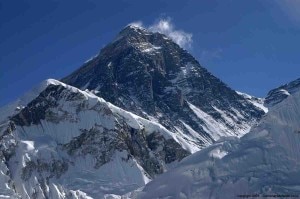Everest climbing rules to be tightened from next year
KATHMANDU, Nepal-Nepalese officials say that for the first time, a government team will be stationed at the base camp of Mt. Everest and will monitor, help expedition teams, coordinate rescues and protect the environment.
The move follows embarrassing incidents on the slopes of the world’s 8,848 meter tallest peak, including a brawl between Sherpas and mountaineers that took place a few months ago.
“A need for a permanent government mechanism at the Everest base camp… [will] regulate mountaineering activities,” Purna Chandra Bhattarai, chief of the tourism industry division that oversees mountaineering, told the BBC.
According to Bhattarai, starting from next year’s spring climbing season, the team at base camp will represent the government’s administration on the ground. At a time observers and mountaineering experts were complaining of difficulty to regulate mountaineering activities from the capital, Kathmandu, Bhattarai’s announcement to spread a government team at the base camp came.
Named it as the Integrated Service Centre, the members of the center will offer communication and other safety related measure beside other services to the mountaineers.
“When there is the presence of the government on the ground, the message ‘violating the law is punishable’ becomes clearer,” he said.
Current rules require each climbing team to have a government employee as a liaison officer during expeditions. But there has been widespread criticism that designated liaison officers often do not even leave Kathmandu and there is no-one to regulate expedition teams on the mountain.
“And even when the liaison officers rarely visited to the field, they were accountable to expedition teams only and not to the system [of government],” Mr Bhattarai further said adding that people were trying to make bizarre records like, for instance, standing on their head or taking off their clothes while on the summit.
Likewise, Ang Tshering Sherpa, the immediate past president of the Nepal Mountaineering Association (NMA) – a professional agency of expedition operators told to BBC that they have had many examples in the past when climbers did not share their specific plan to set a record ahead and they made the record claims only after they reached the summit.
The incumbent president of NMA, Zimba Zangbu Sherpa, said such criteria existed in the past as well and climbers were required to inform the tourism ministry of their plans to set records.
“That rule was flouted and now the idea is to strongly remind climbers what they can do and what they cannot, just when they are about to begin the climb”, Sherpa further told to BBC.


